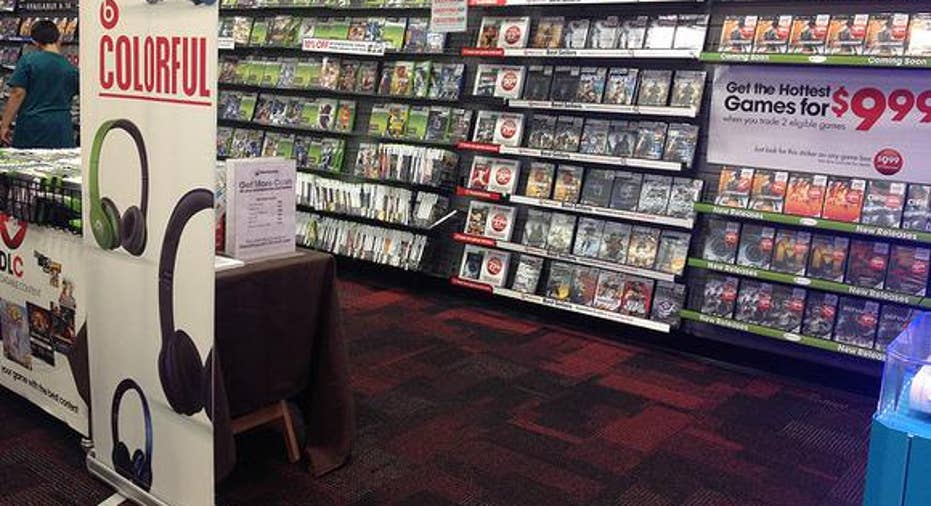It Looks Like Game Over for GameStop Corp.

Like DVD movie rentals, buying video games at a retail store is a dying business.
The rationale behind GameStop existing as a business, let alone as an investment, is over. With gaming transitioning to a digital download format, the need for an expansive specialty retailer selling hard copies of gaming titles is quickly fading. While an innovative company might be able to figure out a way to evolve into a business that grows with the times, GameStop hasinstead chosen a path that ensures it will only exist as a much smaller, wholly irrelevant entity.
Downloads taking it downNew game software revenue tumbled more than 10% in the fiscal fourth quarter ending Jan. 30, accelerating a decline that saw sales fall 6% across all of 2015. And the outlook isn't much better, with total sales expected to drop as much as 7% in the first quarter, though GameStop says they will eventually even out as the year progresses. Heck, they could also end up 3% higher, too!
Of course, it thought 2015's total sales could be as much as 4% higher, and we see how that worked out, but the reason for GameStop's optimism is what should have investors worried.
GameStop finds itself at a juncture much like the one that faced Netflix several years ago: It's once-thriving DVD movie rental business was increasingly transitioning to a digital streaming model, so it could either evolve with it, or find itself in a position like Blockbuster. Netflix chose evolution, making the jump not only to providing streaming movies, but also creating its own content.
GameStop seems more like Redbox parent Outerwall , which remains doggedly wedded to the DVD rental model, even as it makes a late, second foray into streaming video.
Dialing up failureThe game retailer's strategy for coming to grips with the changing landscape of the industry is...selling AT&Tmobile phones. What?!
GameStop's Technology Brands division, which, in addition to its Spring Mobile division (the AT&T wireless retailer it bought in 2013) also runs 76 Simply Mac stores sellingApple laptops, tablets, and smartphones, saw revenues rise 26% last year. It plans on building upon that success.
Last year, as it was slashing the total number of retail video game stores by closing a net of 156 locations,it vastly expanded the footprint of its Technology Brands division by adding 552 stores. Sure, it still has almost 6,100 video game stores, compared to a little more than 1,000 mobile phone and Mac stores (and three dozen collectibles outlets),but it will be the Technology Brands outlets that see the lion's share of future growth, with as many as 550 new stores planed to open this year.
Still, that muscular growth brought division revenues to just $653 million, or 7% of the specialty retailer's $9.4 billion in total sales. It's worrisome that management sees that as being its growth driver for the future, and that it thinks it can supplant the bulk of its gaming revenue.
Mobile phone sales are the dying gasp of an ailing, failing businesses. Circuit City and RadioShack turned from beingspecialty electronics retailers into cell phone sellers because it looks like easy money. The problem is, consumers can buy a cell phone anywhere, so it gives GameStop absolutely no competitive edge.
Hey Mac, can you spare a dime?And don't expect anything out of the Simply Mac business, either. Consumers have a choice of shopping at an actual Apple store, or at the many Mac boutique shops that litter the landscape. Even office supplies retailer Staples once believedselling more Mac products would help its business. It didn't, and now it's fighting the government for its survival.
The Apple store experience isn't easy to replicate: The salespeople are generally more knowledgeable about the products, the latest products are broadly available, and the environment is aesthetically pleasing. More likely than not, if someone's going to go to a bricks-and-mortar location to buy a Mac, it will be an Apple store.
Still, GameStop thinks this is its future. Investors should realize that bymaking a big bet on a game already saturated with too many players, it's game over for GameStop.
The article It Looks Like Game Over for GameStop Corp. originally appeared on Fool.com.
Rich Duprey has no position in any stocks mentioned. The Motley Fool owns shares of and recommends Apple and Netflix. The Motley Fool has the following options: short July 2016 $28 puts on GameStop. Try any of our Foolish newsletter services free for 30 days. We Fools may not all hold the same opinions, but we all believe that considering a diverse range of insights makes us better investors. The Motley Fool has a disclosure policy.
Copyright 1995 - 2016 The Motley Fool, LLC. All rights reserved. The Motley Fool has a disclosure policy.



















